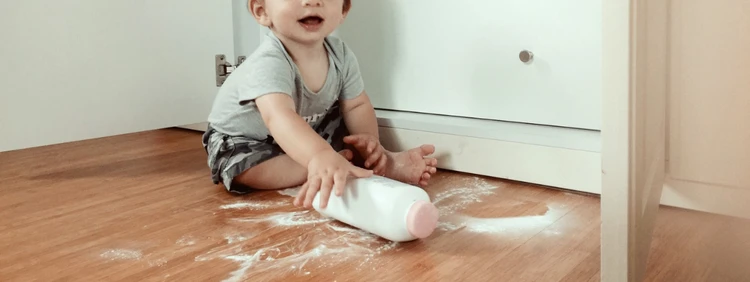You may have seen the news. With major companies recalling lines of baby powder after lawsuits concerning their products, it’s totally understandable that you might feel nervous about the whole thing. So, is baby powder safe?
Of all the products that are controversial, a powder to protect your baby’s bum may seem like an unlikely suspect. But as it turns out, the tale of talc is one with many twists and turns.
Let’s take a look, starting at the very beginning.
In this article 📝
- What is baby powder used for?
- Why is baby powder not recommended?
- What baby powder is safe?
- Is baby powder safe to use now? The bottom line.
What is baby powder used for?
Baby powder has been used for decades as a method of choice to prevent diaper rash.
It’s great at sucking up moisture and preventing your baby’s bum from chafing against their diaper.
It’s also got several other uses. Happy to spring into action as a dry shampoo, aftershave, and a way to keep your genital area dry, baby powder has also been known to freshen up smelly shoes and remove sand after trips to the beach. That’s some dynamic dust.
So why all the debate? Well, it may not be as safe as we have always thought.
Baby powder is most commonly made from talc—hence the name talcum powder.
Talc is a natural mineral made up of magnesium, silicon, oxygen, and hydrogen.
It’s been used for centuries across the globe in everything from paint to paper to powders.
While it occurs naturally, talc is surrounded by a cloud of controversy.
- Manufacturers say it’s safe.
- Many medical experts and regulatory boards say it’s not.
- The FDA is conducting ongoing research into the issue.
So does that mean that baby powder dangers outweigh baby powder benefits? Perhaps.
Why is baby powder not recommended?
While baby powder might be good for your baby’s bum, it might not be as good for their lungs.
When inhaled, baby powders can cause breathing trouble and are linked to asthma, pneumonia, and other respiratory illnesses.
Perhaps the most alarming reason to steer clear is that some baby powders may be contaminated with asbestos.
The presence of asbestos in baby powders has been linked to a deadly cancer called Mesothelioma that affects the tissue in the lungs.
It’s not surprising then that the International Agency for Research on Cancer classifies baby powder with asbestos in it as “carcinogenic to humans”.
How present asbestos is in common brands of baby powder remains to be seen.
The FDA’s most recent sampling did not detect significant amounts. Either way, it’s probably a good idea to proceed with caution.
In fact, the American Academy of Pediatrics (AAP) has warned against the dangers of talcum powder for decades.
- Here’s what they had to say in 1969, where they linked it to acute and chronic lung disease.
- And here’s their 1981 warning where they alerted the public again to the mortal danger of talc inhalation.
- More recently, the word was to avoid baby powder completely because of its link to respiratory problems, especially for babies who were born prematurely or who have other health conditions.
And it may not just be your baby who is at risk. While the findings are mixed, there is also research to suggest that talcum powder and ovarian cancer might be linked, particularly if you use it around your genital area.
So, yes, there are good reasons to dodge the talc—but what about baby powder alternatives? Are there any safe options out there?
What baby powder is safe?
The most commonly used alternative to talc is cornstarch, with many new products using this as their base ingredient.
Some lesser-used alternatives are:
- Kaolin
- Arrowroot powder
- Oat flour
- Baking soda
- Zinc oxide
Although some of these alternatives appear to be safer than their talc counterparts, the AAP is not too keen on them either.
Their recommendation remains the same regardless of the powder’s main ingredient—counterintuitively, baby powder and babies are not a good mix.
Is baby powder safe to use now? The bottom line.
Baby powder risks appear to outweigh baby powder uses. If you can steer clear of it, do.
That being said, the tradition of using baby powder is one that will not disappear quietly.
Ultimately, you make the decisions that you think are right for your family.
There are still many products on the market—and the FDA is constantly testing them for safety.
And if you’re looking for some other ways to prevent diaper rash, here are some ideas:
- Change your baby’s diaper often.
- Keep the bum area as clean and dry as possible. Pat them down with a clean towel and let them air dry.
- Let them go commando for a bit. Nothing like letting it all hang out.
- Consider oil-based lotions and creams as an alternative to baby powder
And if you’re looking for support, join us on Peanut. We don’t have to do this alone.
👶 See next:
How to Give a Newborn a Sponge Bath
How To Wash Cloth Diapers
Diaper Bag Essentials Not To Forget
How Many Diapers Do I Need for a Newborn?
An Intro to Babies at Bathtime
How Often to Bathe a Newborn

